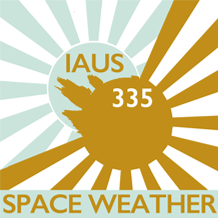Articles

The events are part of the high-profile international symposium.
Interactive family events to give public fascinating insight into space weather
People of all ages will be given a fascinating insight into the future of pioneering space weather research, during a special series of interactive events, later this month.
Some of the world’s leading experts in the burgeoning field of space weather will host a number of lively, fun, and interesting family and school events, hosted by the University of Exeter alongside the Met Office and the Norman Lockyer Observatory.
The events are part of the high-profile international symposium, entitled Space Weather of the Heliosphere: Processes and Forecasts, at the Northcott Theatre on the Streatham Campus in Exeter from July 17-21 2017.
As well as a series of free public lectures for members of the public, there will also be hands-on workshops and activities for children and adults of all ages at the Northcott Theatre on the campus and in Sidmouth at the Kenneway House and at the Norman Lockyer Observatory on their nationally-renowned site in East Devon.
Dr Claire Foullon, a Senior Lecturer from the Centre of Geophysical and Astrophysical Fluid Dynamics at the University of Exeter and organiser of the event said: “UK and international guest public lecturers will engage with schools, teachers and the general public about space weather in July 2017 in an active parallel education program running alongside the IAU Symposium 335 in Exeter.
“This event gives us the perfect opportunity to encourage and inspire a new generation of people, of all ages, to find out about the importance and significance of space weather.
“As modern society becomes increasingly dependent on ground- and space-based technology, it also becomes increasingly vulnerable to the effects of space weather.
“Not only is it important for the public to better understand space weather but it is also an area of astronomy and space physics that inspires the public with beautiful phenomena such as auroras.”
The University will also host a series of public events over the course of the event, open to the local community. These include:
• Treasures of the Lockyer archive: from the University of Exeter Library Special Collections
• Space and Astronomy and the moving image: a special exhibition from the Bill Douglas cinema museum – from the first experiments in projection to merchandise from the latest Hollywood blockbusters, how space and the planets have been depicted in popular visual culture and cinema.
• A day of hands-on workshops and short talks for schools (two age groups: 12-14 and 15-17 years old), including a school poster competition on space weather, which will be judged by members of the Symposium.
• A twilight Continuing Professional Development (CPD) session for teachers, providing an update on the most current research and demonstrating the links with the national curriculum.
The symposium, approved at the 98th International Astronomical Union (IAU) Executive Committee meeting last year, will be the first of its kind held in Exeter, following a successful bid by Dr Claire Foullon.
It is designed to provide a platform for advances in the field of space weather, as well as discuss key questions and emerging concepts, through a series of invited and contributed talks, and poster papers. The Symposium will welcomes around 200 delegates from 31 countries.
Dr Foullon added: “What is most special about the history of space weather for our conference is that "the first recorded impact of space weather on civilisation" can be placed here, in the South West, when the original Great Western Railway (GWR) company was operating. On October 18 1841, the 10.05 PM train between Starcross and Exeter, had been delayed by 16 minutes, on the account of a very intense magnetic disturbance, at a time when telegraphs were means of communication to give clearance for railway switching.”
For further details and to register for the public events, please visit the dedicated webpages.
Date: 10 July 2017
